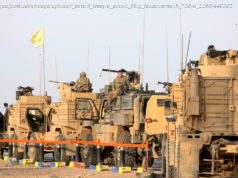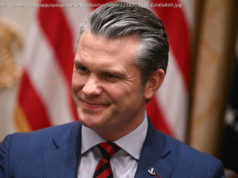Hint: They’re winning in other ways.
As America enters the 18th year of its war in Afghanistan and its 16th in Iraq, the war on terror continues in Yemen, Syria, and parts of Africa, including Libya, Niger, and Somalia. Meanwhile, the Trump administration threatens yet more war, this time with Iran. (And given these last years, just how do you imagine that’s likely to turn out?) Honestly, isn’t it time Americans gave a little more thought to why their leaders persist in waging losing wars across significant parts of the planet? So consider the rest of this piece my attempt to do just that.
Let’s face it: profits and power should be classified as perennial reasons why US leaders persist in waging such conflicts. War may be a racket, as General Smedley Butler claimed long ago, but who cares these days since business is booming? And let’s add to such profits a few other all-American motivations. Start with the fact that, in some curious sense, war is in the American bloodstream. As former New York Times war correspondent Chris Hedges once put it, “War is a force that gives us meaning.” Historically, we Americans are a violent people who have invested much in a self-image of toughness now being displayed across the “ global battlespace .” (Hence all the talk in this country not about our soldiers but about our “ warriors .”) As the bumper stickers I see regularly where I live say: “God, guns, & guts made America free.” To make the world freer, why not export all three?
Add in, as well, the issue of political credibility. No president wants to appear weak and in the United States of the last many decades, pulling back from a war has been the definition of weakness. No one — certainly not Donald Trump — wants to be known as the president who “lost” Afghanistan or Iraq. As was true of Presidents Lyndon Johnson and Richard Nixon in the Vietnam years, so in this century fear of electoral defeat has helped prolong the country’s hopeless wars. Generals, too, have their own fears of defeat, fears that drive them to escalate conflicts (call it the urge to surge) and even to advocate for the use of nuclear weapons, as General William Westmoreland did in 1968 during the Vietnam War.
Washington’s own deeply embedded illusions and deceptions also serve to generate and perpetuate its wars. Lauding our troops as “ freedom fighters ” for peace and prosperity, presidents like George W. Bush have waged a set of brutal wars in the name of spreading democracy and a better way of life. The trouble is: incessant war doesn’t spread democracy — though in the twenty-first century we’ve learned that it does spread terror groups — it kills it. At the same time, our leaders, military and civilian, have given us a false picture of the nature of the wars they’re fighting. They continue to present the US military and its vaunted “smart” weaponry as a precision surgical instrument capable of targeting and destroying the cancer of terrorism, especially of the radical Islamic variety. Despite the hoopla about them, however, those precision instruments of war turn out to be blunt indeed, leading to the widespread killing of innocents, the massive displacement of people across America’s war zones, and floods of refugees who have, in turn, helped spark the rise of the populist right in lands otherwise still at peace.
Lurking behind the incessant warfare of this century is another belief, particularly ascendant in the Trump White House: that big militaries and expensive weaponry represent “ investments ” in a better future — as if the Pentagon were the Bank of America or Wall Street. Steroidal military spending continues to be sold as a key to creating jobs and maintaining America’s competitive edge, as if war were America’s primary business. (And perhaps it is!)
Those who facilitate enormous military budgets and frequent conflicts abroad still earn special praise here. Consider, for example, Senator John McCain’s rapturous final sendoff, including the way arms maker Lockheed Martin lauded him as an American hero supposedly tough and demanding when it came to military contractors. (And if you believe that, you’ll believe anything.)
Put all of this together and what you’re likely to come up with is the American version of George Orwell’s famed formulation in his novel 1984: “war is peace.”
Twenty years ago, when I was a major on active duty in the US Air Force, a major concern was the possible corroding of civil-military relations — in particular, a growing gap between the military and the civilians who were supposed to control them. I’m a clipper of newspaper articles and I saved some from that long-gone era. “Sharp divergence found in views of military and civilians,” reported the New York Times in September 1999. “Civilians, military seen growing apart,” noted the Washington Post a month later. Such pieces were picking up on trends already noted by distinguished military commentators like Thomas Ricks and Richard Kohn. In July 1997, for instance, Ricks had written an influential Atlantic article, “The Widening Gap between the Military and Society.” In 1999, Kohn gave a lecture at the Air Force Academy titled “The Erosion of Civilian Control of the Military in the United States Today.”
A generation ago, such commentators worried that the all-volunteer military was becoming an increasingly conservative and partisan institution filled with generals and admirals contemptuous of civilians, notably then-President Bill Clinton. At the time, according to one study, 64% of military officers identified as Republicans, only 8% as Democrats and, when it came to the highest levels of command, that figure for Republicans was in the stratosphere, approaching 90%. Kohn quoted a West Point graduate as saying, “We’re in danger of developing our own in-house Soviet-style military, one in which if you’re not in ‘the party,’ you don’t get ahead.” In a similar fashion, 67% of military officers self-identified as politically conservative, only 4% as liberal.
In a 1998 article for the US Naval Institute’s Proceedings, Ricks noted that “the ratio of conservatives to liberals in the military” had gone from “about 4 to 1 in 1976, which is about where I would expect a culturally conservative, hierarchical institution like the US military to be, to 23 to 1 in 1996.” This “creeping politicization of the officer corps,” Ricks concluded, was creating a less professional military, one in the process of becoming “its own interest group.” That could lead, he cautioned, to an erosion of military effectiveness if officers were promoted based on their political leanings rather than their combat skills.
How has the civil-military relationship changed in the last two decades? Despite bending on social issues (gays in the military, women in more combat roles), today’s military is arguably neither more liberal nor less partisan than it was in the Clinton years. It certainly hasn’t returned to its citizen-soldier roots via a draft. Change, if it’s come, has been on the civilian side of the divide as Americans have grown both more militarized and more partisan (without any greater urge to sign up and serve). In this century, the civil-military divide of a generation ago has been bridged by endless celebrations of that military as “the best of us” (as Vice President Mike Pence recently put it).
Such expressions, now commonplace, of boundless faith in and thankfulness for the military are undoubtedly driven in part by guilt over neither serving, nor undoubtedly even truly caring. Typically, Pence didn’t serve and neither did Donald Trump (those pesky “ heel spurs ”). As retired Army Colonel Andrew Bacevich put it in 2007: “To assuage uneasy consciences, the many who do not serve [in the all-volunteer military] proclaim their high regard for the few who do. This has vaulted America’s fighting men and women to the top of the nation’s moral hierarchy. The character and charisma long ago associated with the pioneer or the small farmer — or carried in the 1960s by Dr. King and the civil-rights movement — has now come to rest upon the soldier.” This elevation of “our” troops as America’s moral heroes feeds a Pentagon imperative that seeks to isolate the military from criticism and its commanders from accountability for wars gone horribly wrong .
Paradoxically, Americans have become both too detached from their military and too deferential to it. We now love to applaud that military, which, the pollsters tell us, enjoys a significantly higher degree of trust and approval from the public than the presidency, Congress, the media, the Catholic church, or the Supreme Court. What that military needs, however, in this era of endless war is not loud cheers, but tough love.
As a retired military man, I do think our troops deserve a measure of esteem. That said, the military does not deserve the deference of the present moment, nor the constant adulation it gets in endless ceremonies at any ballpark or sporting arena. Indeed, deference and adulation, the balm of military dictatorships, should be poison to the military of a democracy.
With US forces endlessly fighting ill-begotten wars, whether in Vietnam in the 1960s or in Iraq and Afghanistan four decades later, it’s easy to lose sight of where the Pentagon continues to maintain a truly winning record: right here in the USA.
Start
United States
USA — Events Why Does the US Military Have Sky-High Approval Ratings During Endless Wars?






